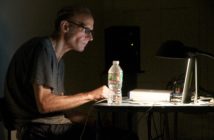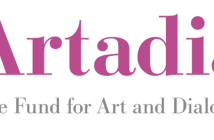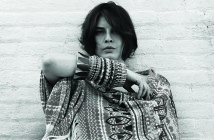Non-Event, the Boston-based experimental music concert series, is about to start its 10th season. Over the past decade, it has steadily built a strong reputation and following through its cutting edge programming, and has partnered with many venues and institutions around the city, from MIT, to Studio Soto, to the Goethe-Institut. I had a brief chat with Susanna Bolle, Non-Event's director and the producer-host of Rare Frequency on WZBC 90.3 FM, who called in from Berlin. We discussed their current fundraiser (Non-Event's Kickstarter campaign ends in 3 days), upcoming performances, Berlin's CTM Festival, and why you shouldn't be afraid of sound.
Stephanie Cardon What drew you to the field of experimental music programming? What makes you fight for it?
Susanna Bolle I fight for this music, because I really love it. It boils down to something that's not very intellectual at all. Putting on a really great concert or having my brain properly addled by music is one of the great pleasures of life. I don't expect to like everything—and lord knows I don't. I grew up with two parents who are musicians, who ran a classical music festival in rural New Hampshire that presented a wide variety of music, so I like live music. You could say that it's in my blood.
Stephanie That's a refreshing sentiment. Many people assume they should "get" sound art or experimental music, and understand it rather than just let themselves experience it. Why do you think there is this tendency to intellectualize it so much?
Susanna At times, there's a tendency by the artists themselves to intellectualize what they do to an extent that can be a little forbidding to the uninitiated. Plus, sound art and experimental music is often presented in spaces that can be intimidating. Even when a performance is ostensibly informal, as in the case of a basement show, it can turn people off, because it's like entering a stranger's house.
Stephanie Is there an event in the 2013 concert series that you're really looking forward to?
Susanna Well, the next show is a good one, because it's confirmed. We've got three great artists—it's essentially a triple bill. Here's the line-up: Hong Chulki from Seoul, South Korea, which has an amazing experimental music scene that's centered around his label Balloon + Needle. This will be his first show in Boston. Judy Dunaway is a veteran sound artist, who plays using balloons. She's really incredible and hasn't played out much in a while, so we're thrilled to have her play. Finally, there's Bryan Eubanks, who's a fantastic player who is currently based in New York. I just saw him here in Berlin and he's played Non-Events in the past. He's great. That's at the Washington Street Art Center in Somerville on February 12th.
Now for items with unconfirmed dates... Leif Elggren and C.M. von Hausswolff from Sweden, probably in June. They are legendary figures in Swedish sound art and experimental music. Leif played an incredible Non-Event concert as Sons of God, with Kent Tankred, a couple of years ago.
Finally, and here we're getting into something that's in the planning stages, but things are looking really promising: a multi-concert/performance event featuring artists from the Pan label from Berlin. They release some incredible music and there's a strong local connection here. Keith Fullerton Whitman is on the label, as is Eli Keszler, who is from Brookline (now based in Brooklyn). This will be done as part of our partnership with Boston's Goethe-Institut, and in collaboration with Issue Project Room in New York. I just saw a concert here in Berlin at Berghain featuring artists from Pan, including many of the people who we plan to bring. It was incredible: Keith, Mark Fell, Lee Gamble, Heatsick, Florian Hecker (who teaches at MIT), all on a huge soundsystem. It was very inspiring. And exhausting.
Stephanie While we're on the topic of Berlin, what are you doing there? And, I also wonder given Non-Event's partnership with the Goethe and the many artists who either originate in Berlin or move there to live/work, how the city supports experimental music and sound art practices? It's an amazing city for art, do you also find that experimental music is strongly supported and appreciated there?
Susanna I'm attending the CTM/Transmediale festival. I've taken intensive German classes for a month and have been to a lot of concerts, met with musicians, etc. We've partnered with the Goethe-Institut in Boston for a number of years and they really wanted me to go to CTM and the way to do it was to take German. Suffice it to say, perhaps, that I'm here as part of our partnership with the Goethe. I was happy to do it! Taking German lessons is small price to pay. There's a festival curator from Uruguay who I met here who is in the same boat.
The CTM festival is really amazing. The fact that there is so much for support for this kind of enterprise here speaks volumes. Even in a slow month like January, Berlin has an amazing amount going on. There are excellent sound art exhibitions, improv concerts (the Berlin improv scene is just fantastic), and electronic music of all varieties. They really support art here and see it as part of what sets the city apart. The energy here is palpable. For all kinds of art. Not just music.
Stephanie Coming from France myself, I'm always so impressed by France and Germany's cultural outreach in countries around the world - whether you're in Paris, Warsaw or Boston, the Goethe is always programming fantastic stuff. I really wish the US, given how many strong artists live here, had a similar cultural presence worldwide. There's a totally different sense of what it means to support the arts in the USA. Support here seems to come primarily from private enterprise and individuals.
Susanna Right. Our biggest single supporter is the Goethe-Institut, which while it's fantastic, is also frustrating. Our biggest single supporter should be local. We're also lucky in that the Goethe in Boston is exceptionally open and supportive of experimental music. From what I understand, this is not the case with all Goethe-Instituts. Arts funding in the USA is very difficult. We're still trying to figure out how to make a go of it, but I suspect it's never going to be easy. The end result is worth it, so you just keep plugging away. Really, it's immensely rewarding work, but it doesn't pay for retirement or healthcare or anything concrete. And that's not really the point anyway (that is, my healthcare or Benny's retirement, etc [Benjamin Nelson and Ernst Karel partner with Susanna to run Non-Event]). It's more that we want to build a self-sufficient organization, which will enable us to put together even stronger seasons.
Stephanie This isn't the first time you've used Kickstarter to cover Non-Event's concert series. What's the attraction of this system over other kinds of fundraising and sponsorship? We opted for it to cover the BR&S relaunch because we'd noticed events that used it seemed to draw a more diverse group of people—it was as if people felt they owned part of the project, and they showed up to support the outcome. Did you find that last year too? Did you gain new followers and supporters? I don't mean to sound like a Kickstarter marketer. It's always astonishing to me how many creative and artistic programs get funded through it!
Susanna We've always relied on a broad array of supporters, rather than on any single person or small number of people. Frankly, we do try other methods as well, but, last year at least, Kickstarter worked really well for us. You reach a whole new audience and rally the one that you already have. I think one of the reasons it was successful last year was that people could see how much had been donated. We often seem like we have a lot of resources, but we don't. People assume that we're getting more support money-wise than we do. It is not easy to get funding for the kind of music we present.
Stephanie Why the challenge to find other kinds of funding? Do people assume you are programming for a niche audience?
Susanna I was speaking more about foundation grants. The music that we present doesn't fall all that easily into established categories, so we tend to fall through the cracks. We don't present just new composed music, sound art, or improvised music; we present all of those types of music, so we don't often fit. If times were less lean in terms of arts funding, this wouldn't be such a problem, but right now, we tend to fall just slightly outside of the core missions of most grant-giving organizations. There doesn't seem to be the same amount of funding available for experimental music as there is for art, but perhaps this is just a case of the grass being greener...
Stephanie Here's to your success!
Non-Event is on Twitter @nonevent and Facebook.
Sign up for the mailing list to receive announcements of upcoming shows.
You can support Non Event's 2013 Concert Season here.



